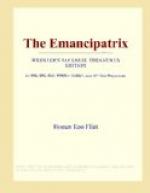The doctor asked if the others had any suggestions. Smith offered this: why couldn’t the humans retire to some cave, or build tight-walled huts, and thus bar out the bees?
No sooner had he made the remark, however, than the engineer declared his own plan no good. “These people aren’t like us; they couldn’t stand such imprisonment long enough to make their ‘strike’ worth while.”
“Is there any reason,” suggested Billie, indifferently, “why they couldn’t weave face nets from some kind of grass, and protect themselves in that way?”
Smith saw the objection to that, too. “They’d have to protect themselves all over as well; every inch would have to be covered tightly. From what I’ve seen of them I’d say that the arrangement would drive them frantic. It would be worse than putting clothes on a cat.”
“It’s a man-sized job we’ve tackled,” commented the doctor. “What Smith says is true; such people would never stand for any measures which would restrict their physical freedom. They are simply animals with human possibilities, nothing more.”
He paused, and then added quietly, “By the way, did either of you notice any mountains just now?”
Smith and Van Emmon both said they had. “Why?”
“Of course, it isn’t likely, but—did you see anything like a volcano anywhere?”
“No,” both replied.
“Another thing,” Kinney went on. “So far, I’ve seen nothing that would indicate lightning, much less the thing itself. Did either of you,” explicitly, “run across such a thing as a blasted tree?”
They said they had not. Billie hesitated a little with her reply, then stated that she had noted a tree or two in a state of disintegration, but none that showed the unmistakable scars due to being struck by lightning.
“Then we’ve got the key to the mystery!” declared the doctor. “Remember how brown and barren everything looks, excepting only where there’s artificial vegetation? Well, putting two and two together, I come to the conclusion that Sanus differs radically from the earth in this respect.
“The humans have arrived rather late in the planet’s history. Or—and this is more likely—Sanus is somewhat smaller than the earth, and therefore has cooled off sooner. At any rate, the relationship between the age of the planet and the age of its human occupancy differs from what it is on the earth.”
“I don’t quite see,” from Smith, “what that’s got to do with it.”
“No? Well, go back to the first point: the dried-up appearance of things. That means, their air and water are both less extensive than with us, and for that reason there are far fewer clouds; therefore, it is quite possible that there has been no lightning within the memory of the humans.”
“How so?” demanded the geologist.
“Why, simply because lightning depends upon clouds. Lightning is merely the etheric electricity, drawn to the earth whenever there is enough water in the air to promote conductivity.”




